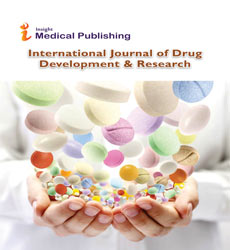Abstract
Qualitative Analysis of the Biological Testing of Novel Telomerase Inhibitors
Cancer is often referred to as being “immortal” because of high telomerase activity in these cells, which allows
them to divide an infinite amount of times. BIBR-1532, (2-{[(2E)-3-(2Naphthyl)-2-butenoyl]amino}benzoic acid) is a
known telomerase inhibitor that has undergone preclinical trials for the treatment of cancer. Based on the structure
of BIBR-1532, three novel N- cinnamoyl substituted anthranilic acid derivatives (2-{[(2E)-3-(4 “ X ” phenyl)-2-
propenoyl]amino}benzoic acids), similar to BIBR-1532 were synthesized. Their efficacies were tested against
proliferative activity in metastatic prostate cancer cells, along with the known telomerase inhibitor BIBR-1532.
Telomerase Repeat Amplification Protocol (TRAP) assays were performed on the compounds to confirm their antitelomerase
activity. The results showed all three newly synthesized cinnamic derivatives have antiproliferative
qualities equivalent to or better than BIBR-1532 (p=0.027) and overall all compounds were significantly lower than
the control (p<0.0001). TRAP assays further confirmed that the compounds also exhibited anti-telomerase activity
like BIBR-1532. The newly synthesized cinnamic acid derivatives of BIBR- 1532 all showed antiproliferative and antitelomerase
activity. While these compounds were all tested against metastatic prostate cancer cells, these potential
treatments have application in all types of cancers demonstrating high telomerase activity.
Author(s):
Suganthi Sridhar, Katie Uhl, Basma Khudur, Bikash Mishra, Robert Smart and William Schroeder
Abstract | PDF
Share this

International Journal of Drug Development and Research peer review process verified at publons
Abstracted/Indexed in
- Google Scholar
- Genamics JournalSeek
- China National Knowledge Infrastructure (CNKI)
- CiteFactor
- Scimago
- Directory of Research Journal Indexing (DRJI)
- WorldCat
- Publons
- MIAR
- ResearchGate
- University Grants Commission
- Secret Search Engine Labs
- Euro Pub
Open Access Journals
- Aquaculture & Veterinary Science
- Chemistry & Chemical Sciences
- Clinical Sciences
- Engineering
- General Science
- Genetics & Molecular Biology
- Health Care & Nursing
- Immunology & Microbiology
- Materials Science
- Mathematics & Physics
- Medical Sciences
- Neurology & Psychiatry
- Oncology & Cancer Science
- Pharmaceutical Sciences


